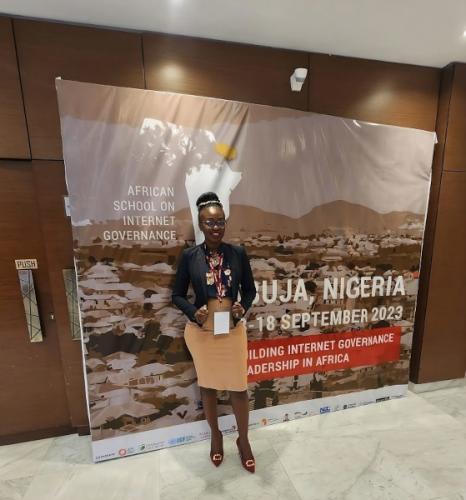
As a participant in the 11th African School on Internet Governance (AfriSIG 2023), I had the privilege of engaging with experts from governments across Africa, members of parliament from different countries, policy makers and other fellow participants to deepen my understanding of crucial topics related to internet governance, data governance and digital transformation. The insights gained during this intensive week of learning will undoubtedly play a pivotal role in shaping the national data strategy of Uganda, the intellectual property guidelines for ICT innovations, and the national digital transformation roadmap for our country.
Understanding internet governance
AfriSIG 2023 provided a comprehensive overview of internet governance, from its historical roots to current challenges and future directions. We explored the significance of open internet principles, concepts and institutions in Africa. This knowledge will be instrumental in guiding Uganda’s approach to internet governance, ensuring that it aligns with our national interests and priorities.
Data governance for development
One of the highlights of AfriSIG was the deep dive into data governance. We delved into concepts, issues and approaches related to data and its role in development. The discussions around the African Union Data Policy Framework and our active participation in developing the guidelines for inclusive, multistakeholder implementation of the Framework provided valuable insights into crafting a data strategy that promotes economic growth and social progress while safeguarding individual rights and privacy. As we work on Uganda’s national data strategy, these insights will be instrumental in developing policies that harness data’s power for all citizens’ benefit.
Digital transformation for a better Uganda
AfriSIG’s focus on digital transformation was directly relevant to our efforts in Uganda. We explored how digital technologies can significantly improve government operations, citizen experience and overall national performance. The ROAM-X Assessment conducted by UNESCO presents a pivotal opportunity and can play a vital role in shaping our programmes and strategies to enhance Uganda’s competitiveness in the global digital economy.
The path forward
Reflecting on my experience at AfriSIG 2023, I am inspired and motivated to apply the knowledge gained to benefit Uganda. We have a unique opportunity to shape the implementation of the digital transformation roadmap, the intellectual property guidelines for ICT, and the national data strategy in ways that align with our specific needs and aspirations. I am committed to leveraging the insights and best practices shared at AfriSIG to contribute to developing policies and strategies that will empower our nation in the digital age.
AfriSIG 2023 equipped me with a deeper understanding of internet governance, data governance and digital transformation. This knowledge will not only inform our national strategies, but also foster collaboration with fellow African countries as we work together to build a brighter digital future for our continent. Uganda is poised for transformative change, and AfriSIG has provided the tools and insights to make it a reality.
I extend my special thanks to Ms. Lillian Nalwoga for her invaluable recommendation and to Ms. Anriette Esterhuysen for her unwavering dedication to driving positive change in Africa’s internet governance landscape. Additionally, I extend my gratitude to the Association for Progressive Communications (APC) for their generous sponsorship, which made my participation in AfriSIG 2023 possible. Together, we are poised to shape a brighter digital future not only for Uganda but for the entire African continent.
Shirley Gladys Nakyejwe is renowned for her innovation-centred approach and expertise in leveraging intellectual property (IP) to enhance competitiveness within the information and communication technology (ICT) sector. Currently serving as a Senior ICT Officer and Intellectual Property Specialist at Uganda’s Ministry of ICT and National Guidance, Shirley is pivotal in guiding young innovators to safeguard their IP assets on ICT-driven solutions. Her comprehensive guidelines encompassing IP ownership, registration, disclosure and commercialisation strategies empower local talents for global competitiveness. Shirley’s influence extends beyond her contributions to innovators; she also contributes to Uganda’s ICT sector through active participation in shaping the Business Process Outsourcing (BPO) Policy. This policy framework is designed to foster a conducive regulatory landscape and provide incentives for local third-party service providers.
